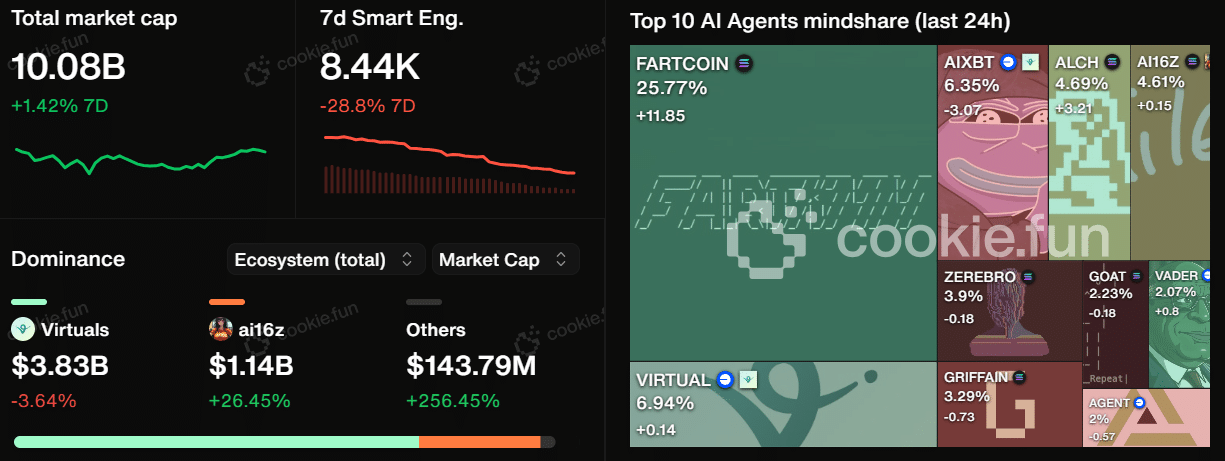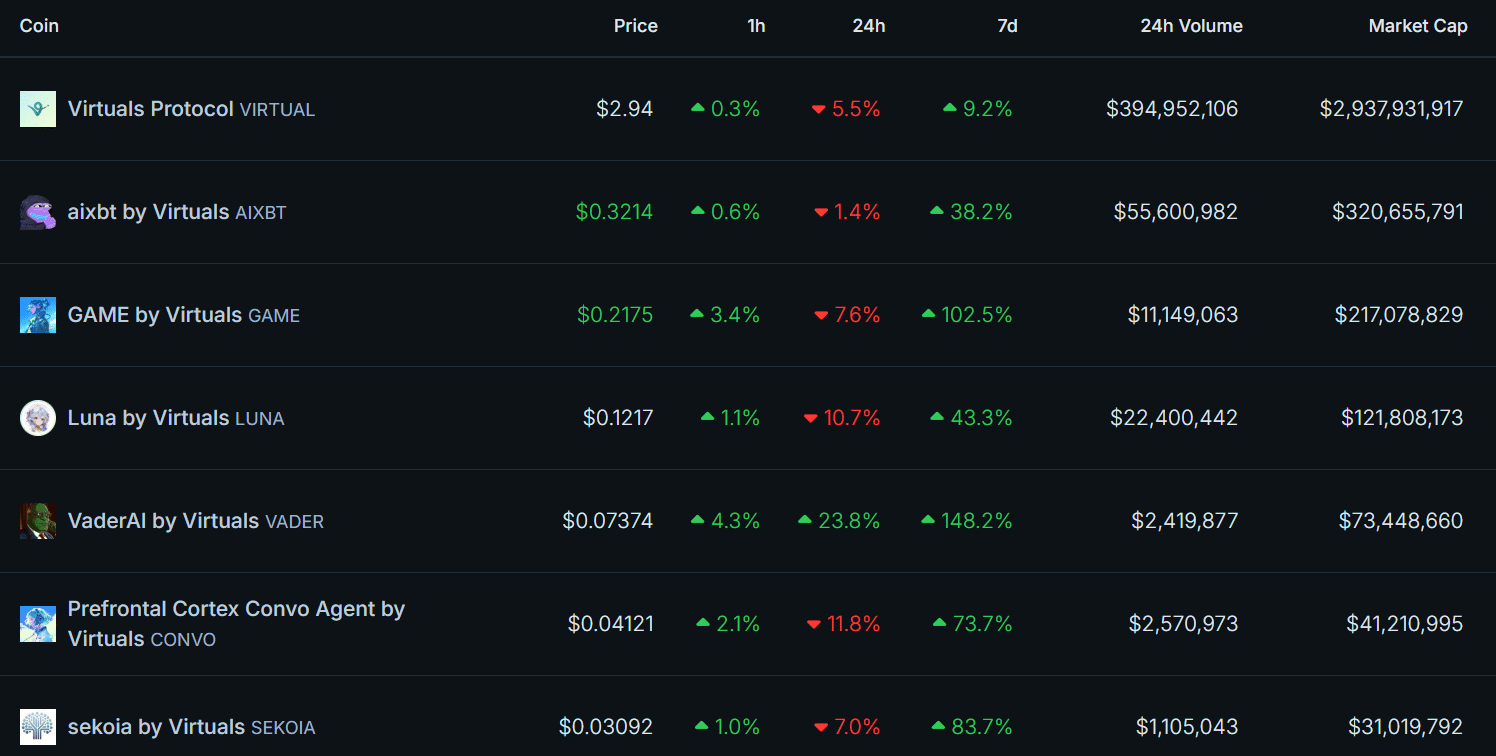- Virtual Protocol and ai16z’s Solana-based Eliza are the main launch pads and dominant players for AI agents
- Despite a recent exploit, Spectral tops on-chain AI agent trading, with agent trading expected to grow by 2025
2024 has been the most impactful year for the AI agent story. What started as a viral exchange between A16z founder Marc Andreessen and an autonomous AI agent Truth Terminal spawned the first-ever “agent millionaire“by the Goatseus Maximus [GOAT] memecoin.
GOAT’s viral success kicked off the AI agent trend. However, the trend quickly changed from memecoins to useful agents, thanks to Base’s Virtual Protocol, a co-owned and launching platform for agents.
Now, almost 12k agents have been launched on the virtual protocol, with various applications including trading, music making, streaming, social media posting, investing, etc.
This has propelled the native token VIRTUAL to unicorn status ($3 billion), underscoring the sector’s growth potential. Another launchpad for AI agents, Solana’s Eliza, joined the race and strengthened the story’s traction.
Industry experts remain optimistic and expect explosive growth in 2025. What is the current status and what to look out for in 2025?
Virtual Protocol leads while ‘Agent Commerce’ takes shape
The best launch pads, VIRTUAL and Solana-based AI16z [AI16Z]the AI VC firm behind the Eliza framework, dominates the sector.
According to data from Cookie.fun, the duo control around half of the total market capitalization, which at the time of writing was around $10 billion.
The virtual ecosystem has one of the most robust designs, linking new agents to the VIRTUAL token and driving value accrual.
Among the 12,000 agents, the top three is Twitter alpha Aixbt [AIXBT]gambling agent Game [G.A.M.E]and social influencer Luna [LUNA]each have a market capitalization of more than $100 million.
Most analysts believe that greater ecosystem traction could push VIRTUAL to decacorn status ($10 billion market cap). That would translate to more than three times the current $3 billion.
But Solana’s Eliza could also gain huge traction, especially as ai16z considers revamping tokenomics to boost its own token and agent framework.
In an exclusive interview with AMBCrypto, James Wo, founder and CEO of digital asset investment firm Digital Finance Group (DFG), said Eliza’s open-source popularity could make it a top contender. He said,
“With many forks in the Eliza repository, this demonstrates the popularity of the Eliza stack and is another strong competitor.”
From a chain perspective, the race is between Base and Solana for the time being, but new nuances may also arise.
Trade between agents
Until recently, most contacts took place exclusively between agents and people. We recently witnessed the first ever agent-to-agent trade. Luna, an AI social influencer, paid Stix Protocol, an image generator, $1 for each piece created to increase her brand awareness.
Jansen Teng, founder of Virtual Protocol, referred to the historical update as ‘agentFi’, which marks the beginning of agents and humans coexisting and influencing each other.
Experts believe that the trend in agent trading will accelerate by 2025. According to Wo, chains like Mode Network are already leading with DeFi agents that drive activities such as lending and liquidity provision.
Likewise, Hyperliquid DEX allows users to implement Spectral [SPEC]an AI trading agent on Virtual Protocol, to execute transactions autonomously. In fact, SPEC has seen huge interest in the OTC (Over the Counter) space, attracting investment from players like Stix.
Part of the Stix’s statement read,
“We are confident that Spectral ($SPEC) will emerge as the frontrunner and are proud to support the team with one of STIX’s largest investments in 2024.”
The company added that recent updates to Spectral would position it firmly within the cycle’s top stories.
“These developments are critical to putting Spectral at the center of the most important stories of this cycle: Memecoins / AI Agents / Hyperliquid / Base.”
Although Spectral recently suffered an exploit that was later fixed, most analysts are still optimistic and vouch for its lead in on-chain trading.
Other agents are also gaining ground niche stories, as summarized below.


Decentralized CO
That said, the space is expanding rapidly and platforms are emerging that enable a decentralized AI agent economy, such as Mode Network. However, the agents may face data privacy issues and regulations.
To address this issue, Jorge António, CTO of Atoma Network, a decentralized network focused on privacy and verifiable AI inference, briefed AMBCrypto on a privacy solution for agents. He said,
“Privacy and auditability, as championed by Atoma, will play a crucial role, allowing agents to become more specialized and handle sensitive data securely while ensuring transparency and trust.”
Antonio added that with increased bot activity, verifying agent activity would improve its integrity and overall growth.
In conclusion, the AI Agent story is centered on Base and Solana, led by Virtual Protocol and Eliza from ai16z.
Some experts believe Spectral could be a strong competitor, given its idiosyncratic catalysts and early lead in the on-chain AI agent business. However, safety and regulatory concerns are likely to gain momentum as agent trafficking increases in 2025.
 Stay cool, stay onchain with .pengu
Stay cool, stay onchain with .pengu 



